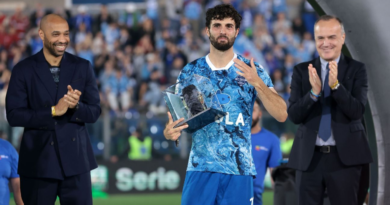What do England need to fix before Euro 2024?
DOHA, Qatar — England‘s wait for a major tournament victory will now extend to at least 58 years. Manager Gareth Southgate is deliberating whether he is the right man to lead the Three Lions into Euro 2024 as the Football Association conducts an internal review into a World Cup campaign which promised so much but ended in an agonising quarterfinal exit to France.
Southgate’s six-year tenure has taken England closer to ending that wait for silverware than ever before, but here ESPN looks at what can be done between now and the next Euros in Germany to help boost their chances of success.
– World Cup 2022: News and features | Schedule | Bracket
Retain Southgate
Public opinion is split on whether Southgate has taken this England squad as far as he can but let’s not lose sight of the progress made on his watch: England won six knockout games in major tournaments between 1968 and 2016; Southgate has won six between 2018 and 2022.
This generation of players want to represent their country again and are inspired by the sense of opportunity rather than being burdened by the weight of history. Southgate has been the driving force of redefining this relationship with the national team, creating a positive environment in camp and fostering a genuine emotional investment in England’s fortunes.
There are better tacticians out there — although Southgate has developed significantly in that area — but any potential replacement would have to ensure the same culture endures, and there is certainly no guarantee of that. His tournament experience is invaluable. England have improved as a team every two years — a quarterfinal exit feels like a step back given it comes after reaching the Euro 2020 final, but the quality of their football was better, and they were desperately close to beating world champions France.
Thomas Tuchel and Mauricio Pochettino have star quality but not the same intimate knowledge of England’s past and present. The leading English candidates — Chelsea‘s Graham Potter and Newcastle’s Eddie Howe — do not (yet) have the same pedigree while Brendan Rodgers’ stock has fallen considerably at Leicester. If Southgate has the energy and desire to continue, he is the best option England have. The FA and the players certainly want him to stay, while a shorter, 18-month tournament cycle heightens the need for continuity.
Make better in-game substitutions
That’s not to say Southgate is flawless. The 52-year-old’s in-game substitutions remain a source of debate. It is rare he changes a game proactively to positive effect. Some of the criticism in this regard against France is debatable, however, as England were the better team at 1-1 so why change a team playing with the momentum to win the game? Plus, Southgate was readying Mason Mount and Raheem Sterling before Olivier Giroud scored France’s winning goal and there was a suggestion that Bukayo Saka picked up an injury, prompting his substitution.
That said, Jack Grealish came on too late and the decision to use Sterling seemed to be based on loyalty rather than a ruthless streak England may have needed in that moment, given the Chelsea winger had flown back to London following a break-in at his home and taken part in one training session on his return to Qatar.
More generally, it is an area in which Southgate could be more clinical, especially given the depth of options at his disposal. It is, of course, something we are all wiser about with hindsight but ultimately this is why managers occupy the positions they do: to make the right decisions at the right times.
– Stream on ESPN+: LaLiga, Bundesliga, more (U.S.)
Improve big-game mentality
England did not get as far as at Russia 2018 (semifinals) or Euro 2020 (final) but there was a clear step forward in Qatar. It is a matter of historical fact that England do not beat elite nations in major tournament knockout matches away from Wembley. And they found success at the last two tournaments through a largely pragmatic, conservative style informed by the belief they were not yet the equals of the game’s finest teams.
That has changed. The squad openly talked about being good enough to win the World Cup and the approach against France was one of Southgate’s boldest team selections given the magnitude of the match, opting against the five-man defence previously used in big games to try and go “toe to toe” as he put it with France in a 4-3-3 shape.
In the context of what was at stake, the second-half performance was one of England’s best under Southgate, but they weren’t able to show the same efficiency as France, who were happy to bide their time and pick a moment to strike. It was a match of fine margins but the idea that England should not possess an inferiority complex against the biggest sides must remain and develop through to 2024. Relegation from the Nations League’s top tier will not help.
Find a top-class centre-back
There is no doubt that Harry Maguire left his indifferent Manchester United form behind him in Qatar. Southgate went out on a limb for the 29-year-old, not just including by naming him in the squad but by retaining him for all four matches, and Maguire vindicated that loyalty to an extent with a series of solid displays. However, he lost Giroud for France’s winning goal, and the suspicion remains that England are still too vulnerable defensively to play the expansive style that the depth of their attacking options demands. John Stones had a good tournament, but England would be improved by the emergence of an elite centre-back in the next 18 months.
In this context, it is imperative that Fikayo Tomori is given a chance to establish himself between now and Euro 2024. Tomori played a pivotal role in AC Milan‘s first Serie A title win in 11 years but has only earned two caps since moving to Italy from Chelsea last year, the last of which came in June. Should he maintain his club form, Tomori, 24, should get a fair opportunity to mark his mark at international level.
Marc Guehi is further behind in his development at Crystal Palace but has great potential, while Ben White is another possible option should there be no lingering issues from the Arsenal defender’s abrupt exit from the England camp in Qatar due to what the FA described as “personal reasons.”
1:05
Steve McManaman praises England’s performance despite losing 2-1 to France at the 2022 FIFA World Cup.
Get more creative in midfield
Jude Bellingham‘s emergence was one of the biggest positives that England can take from Qatar. The 19-year-old showed maturity far beyond his years to add dynamism to a midfield area which has needed it for some time. Southgate was keen to point out Bellingham had more licence to express himself with Declan Rice in the holding role and Jordan Henderson a slightly more conservative No. 8 alongside him in England’s 4-3-3 system.
But, as good as Henderson was in Qatar, could England play with a more attack-minded player in that role? Mason Mount is the obvious candidate but he struggled for form and, after losing to France, it was easy to wonder whether Southgate could do with Phil Foden what Didier Deschamps has done with Antoine Griezmann? Finding a more central position for Foden would allow England to include another attacking player in one of the most advanced positions alongside Harry Kane, where they are so blessed with options.
Foden does not play there for Manchester City, but Deschamps used Griezmann in a different position to solve a specific problem created by injuries to N’Golo Kante and Paul Pogba. There is no guarantee of success but using Foden in this way is at least worth exploring.
Another option is Leicester City‘s James Maddison who, like Tomori, should have been given a chance long before now. Bringing him to Qatar without a cap in three years — and recovering from injury — is one thing, but he didn’t play at all. And the bigger mistake was made earlier — if you can’t trust him in a Nations League game, how can he suddenly be thrown into a World Cup knockout match?
Work on the penalty curse more
Southgate is steeped in the history of England’s painful relationship with penalties. Having missed the decisive spot-kick in England’s Euro ’96 semifinal defeat to Germany, he understands better than most the pressure and psychology involved of such tournament-defining moments.
Consequently, England undertook months of work which included a study commissioned by the FA’s former technical director Dan Ashworth which showed England took their spot-kicks quicker than any other nation. They took penalties at the end of intensive training sessions to recreate the “tired legs” feeling of the real thing. They used goals with nets spread across the line exposing only the four corners in a bid to improve accuracy. And when England beat Colombia at the round of 16 in 2018, the curse appeared to have been banished as they won their first World Cup shootout in their history.
Yet England’s recent history would be very different had their penalty problems not returned: they lost the Euro 2020 final in a shootout to Italy and were knocked out of this World Cup as Kane skied a second penalty with six minutes to go against France which would have likely taken their quarterfinal into extra-time.
Kane is England’s most reliable penalty taker — and there were extreme circumstances in play, not least the lengthy delay for a VAR check and facing his Tottenham teammate Hugo Lloris in the France goal — but if he is fallible, so is this squad in general, and further work needs to be done.



